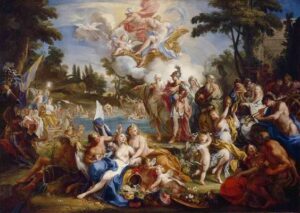Table of Contents
The Elysian Fields, in Greek mythology, constitute a paradisiacal afterlife reserved for souls of the heroic and virtuous, offering eternal bliss to those who led exemplary lives or performed heroic deeds.
Location
In Greek mythology, the exact location of the Elysian Fields is not explicitly specified. Different sources describe it as a realm in the afterlife, but its specific location is left somewhat ambiguous. Some interpretations suggest it may be located in the far west, associated with the setting sun, while others view it as a separate section within the larger realm of the Underworld. The emphasis in Greek mythology is often on the nature of the afterlife and the rewards for virtuous individuals rather than providing precise geographical details.
Sources

The concept of the Elysian Fields is found in various ancient Greek texts, primarily those related to mythology, epic poetry, and philosophical discussions on the afterlife. Key texts and sources that mention or describe the Elysian Fields:
Homer’s Epic Poems:
In “The Iliad” and “The Odyssey,” Homer alludes to an afterlife realm for the blessed and heroic. While not explicitly named as Elysium, these texts contribute to the overall understanding of a special place for the virtuous.
Hesiod’s Works and Days:
Hesiod, in his didactic poem “Works and Days,” discusses the concept of a blessed afterlife for the righteous, mentioning a place where heroes live a carefree existence.
Pindar’s Odes:
Pindar, a lyric poet, wrote odes that often celebrated the achievements of athletes and heroes. Some of his odes make references to a joyful afterlife, possibly akin to the Elysian Fields.
Plato’s Dialogues:
In Plato’s philosophical works, particularly “Phaedo” and “The Republic,” there are discussions about the nature of the soul and the afterlife. Plato’s ideas influenced later interpretations of Elysium and the afterlife.
Virgil’s Aeneid:
While not Greek, Virgil’s Roman epic “Aeneid” depicts a journey to the Underworld, where the protagonist, Aeneas, encounters a realm reminiscent of the Elysian Fields. This influenced later Roman and medieval views on the afterlife.
These texts contribute to the development of the Elysian Fields as a concept in ancient Greek thought, and interpretations and references may vary across different works and authors.
Who Could Enter?

The Elysian Fields typically reserved access for individuals who lived virtuous, heroic, or exceptionally righteous lives. Eligibility criteria included:
- Heroes and Warriors. Those who distinguished themselves through acts of heroism, like warriors who fought valiantly in battles, often gained entry to the Paradise.
- Virtuous Souls. Individuals who led morally upright lives, contributing positively to society and upholding righteousness, were believed eligible for entry.
- Those Favored by the Gods. Versions of Greek mythology suggest that individuals favored by specific gods or goddesses might gain entry into the Paradise.
- Demigods and Offspring of the Gods. Heroes, offspring of gods and mortals (demigods), were often considered worthy of dwelling in the Elysian Fields.
- Initiates of Mysteries. Those initiated into mystery cults or religious rites, such as the Eleusinian Mysteries, were believed to receive favorable treatment, potentially including access to the Elysian Fields.
Modern References
The concept of the Elysian Fields has made its way into various modern references, including literature, film, and popular culture. Here are a few examples:
Literature. Numerous contemporary books and novels draw inspiration from Greek mythology, and the Elysian Fields are often referenced or adapted in modern fantasy literature.
Film and Television. The idea of a paradise or idyllic afterlife is a recurring theme in movies and TV shows. For example, in the film “Gladiator,” the protagonist envisions a reunion with his family in a beautiful afterlife resembling the Elysium.
Video Games. Some video games incorporate the concept of Elysium or Elysian Fields as a location or quest within the game world. These references often tap into the allure of a heavenly and harmonious place.
Music. Musicians and songwriters may use the idea of Elysium metaphorically to convey themes of peace, tranquility, or a utopian existence in their lyrics.
Art and Design. Visual artists draw inspiration from Elysian Fields, infusing works with paradise, nature, and serenity.
FAQ
What is the Elysian Fields in mythology?
The Elysian Fields represent a blissful realm in the afterlife, a reward for individuals who led virtuous lives or performed heroic deeds in Greek mythology.
What is the purpose of the Elysian Fields?
The Elysian Fields serve as a heavenly destination, providing eternal joy and tranquility for those deemed worthy by leading virtuous lives or displaying heroism.
What is the spiritual meaning of the Elysian Fields?
Spiritually, the Elysian Fields symbolize a place of divine reward, emphasizing the value of virtuous living and heroism in the journey beyond mortal life.
Who are the gods in the Elysian Fields?
The Elysian Fields are not typically associated with specific ruling gods; rather, they serve as a serene abode for righteous souls in the afterlife.
Is Elysian Fields a real place?
No, the Elysian Fields are a mythical concept in Greek mythology and do not correspond to a real physical location.
What is the full meaning of Elysian?
Elysian pertains to or is characteristic of the Elysian Fields, often associated with paradise, bliss, or divine happiness.
What is the literal meaning of Elysian?
The literal meaning of Elysian refers to the Elysian Fields or any place or state of blissful happiness.
Who rules Elysium?
The ruler of the Elysian Fields is not explicitly specified in Greek mythology. It is more of a paradisiacal destination than a realm ruled by a specific deity.
Why is Elysian Fields ironic?
The irony in the term "Elysian Fields" lies in its association with paradise and bliss, contrasting with the challenges and struggles often depicted in the heroic deeds required to gain entry.
Did the Romans believe in the Elysian Fields?
Yes, the Romans adopted and adapted many aspects of Greek mythology, including the concept of the Elysian Fields. The Roman equivalent is often identified as "Elysium."




